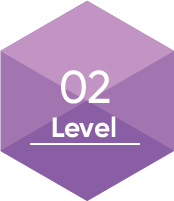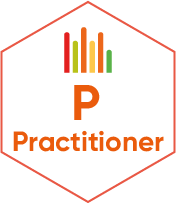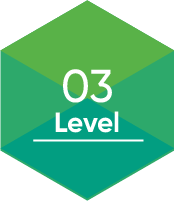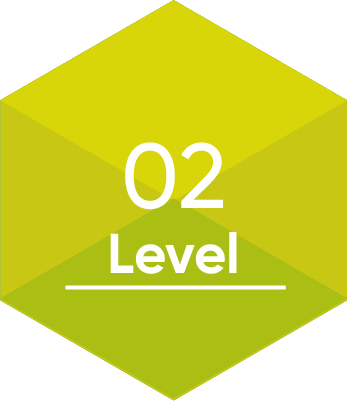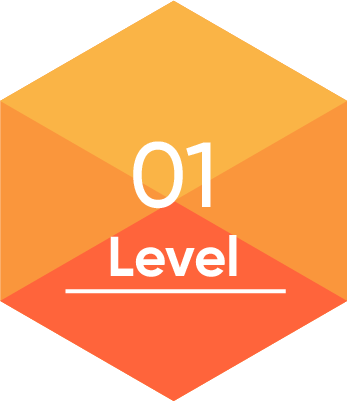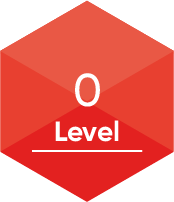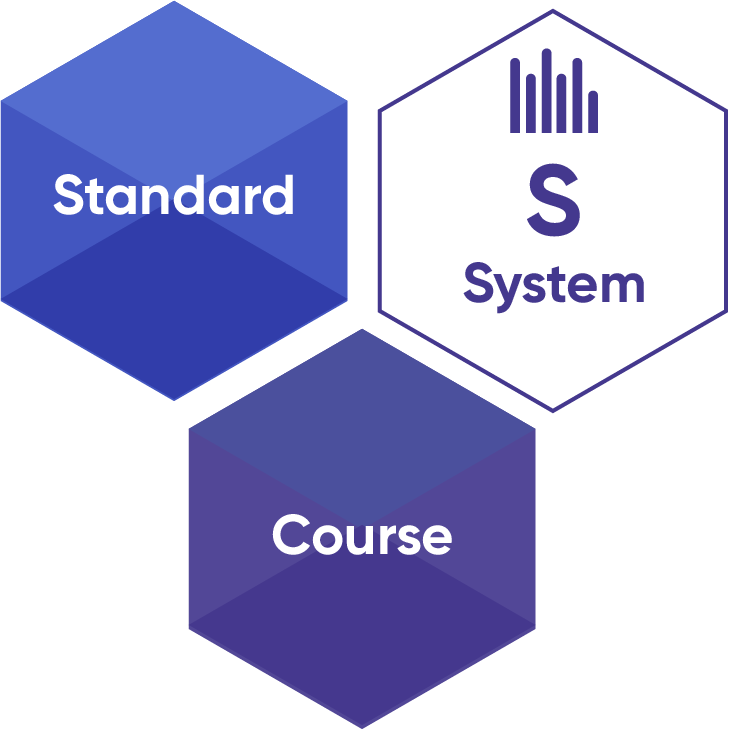By continuing to use this website, you agree to our use of cookies to track analytics and make this web-site better. Details
Agree and close this message
educational programs
d.standards
Certification program for design thinking facilitators.
Зарегистрироваться на мероприятие
The goal of the program is to share the original method of design thinking with coaches, facilitators, scrum-masters, or other specialists who develop internal innovations and integrate digital transformation into companies.
In 2018 we started a certification program in Design Thinking, inviting experts and practitioners from all over the globe to share their experience and knowledge with future facilitators and coaches in Design Thinking.
D.standards
International system of certification for design thinking practitioners.
About levels
A practitioner is a valuable Design Thinking team member and knows the Design Thinking process, methods and principles. The practitioner is also able to apply these skills depending on his/her degree of maturity.
Are you aware of the methods and principles of Design Thinking? Then you should test yourself in one of the practitioner levels.
Are you aware of the methods and principles of Design Thinking? Then you should test yourself in one of the practitioner levels.
Level P0
Methodological skills:
• Knows 10 DT-methods;
• Knows DT-principles, -benefits, -terminology, -process.
Personal and social communicative competency:
• Keen to experiment;
• Ability to understand other perspectives;
• Ability to try new things.
Work experience: not necessary.
Verification: none.
• Knows 10 DT-methods;
• Knows DT-principles, -benefits, -terminology, -process.
Personal and social communicative competency:
• Keen to experiment;
• Ability to understand other perspectives;
• Ability to try new things.
Work experience: not necessary.
Verification: none.
Level P1
Professional and methodological skills:
• Knows 20 DT-methods;
• Knows DT-principles, -benefits, -terminology, -process;
• Is able to apply 10 DT-methods.
Work experience: finished one real life project and run the complete DT-cycle during the project.
Verification: P0, one project reference with contact person.
Personal and social communicative competency: readiness to learn, keen to experiment, ability to understand other perspectives, competency of activity and decision-making, ability to try new things, creative drive.
• Knows 20 DT-methods;
• Knows DT-principles, -benefits, -terminology, -process;
• Is able to apply 10 DT-methods.
Work experience: finished one real life project and run the complete DT-cycle during the project.
Verification: P0, one project reference with contact person.
Personal and social communicative competency: readiness to learn, keen to experiment, ability to understand other perspectives, competency of activity and decision-making, ability to try new things, creative drive.
Level P2
Professional and methodological skills:
• Knows 30 DT-methods;
• Knows and acts according to DT-team rules;
• Knows 20 DT-methods and knows how/when to apply them, also in complex situations;
• Interdisciplinary knowlegde, analytical skills, ability to assess things.
Work experience: minimum 2 years of practicing DT.
Verification:
• P1-certificate not older than 2 years;
• 3 project references with persons to contact.
Personal competency: openness to changes and readiness to learn, holistic thinking, self-reliance.
Social communicative competency: keen to experiment, ability to work in a team, cooperative skills, ability to solve problems, ability to understand other perspectives.
Competency of activity and decision-making: ability to try new things and inspire others, creative drive and optimism.
• Knows 30 DT-methods;
• Knows and acts according to DT-team rules;
• Knows 20 DT-methods and knows how/when to apply them, also in complex situations;
• Interdisciplinary knowlegde, analytical skills, ability to assess things.
Work experience: minimum 2 years of practicing DT.
Verification:
• P1-certificate not older than 2 years;
• 3 project references with persons to contact.
Personal competency: openness to changes and readiness to learn, holistic thinking, self-reliance.
Social communicative competency: keen to experiment, ability to work in a team, cooperative skills, ability to solve problems, ability to understand other perspectives.
Competency of activity and decision-making: ability to try new things and inspire others, creative drive and optimism.
Level P3
Professional and methodological skills:
• Expertise on a P2-Level;
• P3 knows most DT-tools and methods, and how/when to apply them, also in complex DT-projects;
• Interdisciplinary knowledge, analytical skills, ability to assess things, conceptional strength.
Work experience: minimum 5 years.
Verification:
• P2-certificate not older than 2 years;
• References with person to contact;
• Publications;
• DT-Vita.
Personal competency: creative skills, openness to changes, readiness to learn, holistic thinking, discipline, reliability, credibility, self-reliance.
Social communicative competency: keen to experiment, ability to work in a team, openness to dialogue, cooperative skills, ability to solve problems, ability to understand other perspectives.
Competency of activity and decision-making: ability to try new things, inspiring others, creative drive.
• Expertise on a P2-Level;
• P3 knows most DT-tools and methods, and how/when to apply them, also in complex DT-projects;
• Interdisciplinary knowledge, analytical skills, ability to assess things, conceptional strength.
Work experience: minimum 5 years.
Verification:
• P2-certificate not older than 2 years;
• References with person to contact;
• Publications;
• DT-Vita.
Personal competency: creative skills, openness to changes, readiness to learn, holistic thinking, discipline, reliability, credibility, self-reliance.
Social communicative competency: keen to experiment, ability to work in a team, openness to dialogue, cooperative skills, ability to solve problems, ability to understand other perspectives.
Competency of activity and decision-making: ability to try new things, inspiring others, creative drive.
A coach guides teams successfully through the Design Thinking process that has practitioner knowledge and skills with the ability to teach this knowledge and to motivate and guide the practitioners team during the Design Thinking process. The coach is also able to implement and manage Design Thinking process in a department or a company.
Are you able to guide teams successfully through the Design Thinking process and to roll out complete Design Thinking processes in companies? Then you should test yourself in one of the coach levels.
Are you able to guide teams successfully through the Design Thinking process and to roll out complete Design Thinking processes in companies? Then you should test yourself in one of the coach levels.
Level C1
Professional and methodological skills:
• Expertise on a P1-Level;
• Кnows the organizational an processual things that go along with the DT-process like team staffing;space, tools, material, process planning and documentation, (de-)briefing;
• Guides teams, recognizes and is able to react on team dynamics;
• Realize challenges or errors in the DT-project and is able to respond;
• Interdisciplinary knowledge, analytical skills, ability to assess things, ability to lecture.
Work experience: minimum 1 year.
Verification: P0, P1-certificate (optional).
Personal competency: readiness to learn, holistic thinking, reliability, credibility, delegating.
Social communicative competency: openness to dialogue, cooperative skills, ability to understand other perspectives, articulateness, communicative skills.
Competency of activity and decision-making: ability to try new things, inspiring others, initiative.
• Expertise on a P1-Level;
• Кnows the organizational an processual things that go along with the DT-process like team staffing;space, tools, material, process planning and documentation, (de-)briefing;
• Guides teams, recognizes and is able to react on team dynamics;
• Realize challenges or errors in the DT-project and is able to respond;
• Interdisciplinary knowledge, analytical skills, ability to assess things, ability to lecture.
Work experience: minimum 1 year.
Verification: P0, P1-certificate (optional).
Personal competency: readiness to learn, holistic thinking, reliability, credibility, delegating.
Social communicative competency: openness to dialogue, cooperative skills, ability to understand other perspectives, articulateness, communicative skills.
Competency of activity and decision-making: ability to try new things, inspiring others, initiative.
Level C2
Professional and methodological skills:
• Expertise on a P2-Level;
• Is an expert in organizational an processual things that go along with the DT-process like team staffing, space, tools, material, process planning and documentation, (de-)briefing;
• Is able to develop workshop conceptions;
• Interdisciplinary knowledge, analytical skills, ability to assess things, ability to lecture.
Work experience: minimum 2 years.
Verification:
• C1-certificate not older than 2 years;
• References with person to contact;
• DT-Vita;
• Teaching activity (proven);
• P2-certificate (optional).
Personal competency: creative skills, openness to changes, readiness to learn, holistic thinking, reliability, credibility, delegating.
Social communicative competency: openness to dialogue, cooperative skills, ability to understand other perspectives, articulateness, ability to advise others, communicative skills.
Competency of activity and decision-making: ability to try new things, inspiring others, initiative, leading with the target in mind.
• Expertise on a P2-Level;
• Is an expert in organizational an processual things that go along with the DT-process like team staffing, space, tools, material, process planning and documentation, (de-)briefing;
• Is able to develop workshop conceptions;
• Interdisciplinary knowledge, analytical skills, ability to assess things, ability to lecture.
Work experience: minimum 2 years.
Verification:
• C1-certificate not older than 2 years;
• References with person to contact;
• DT-Vita;
• Teaching activity (proven);
• P2-certificate (optional).
Personal competency: creative skills, openness to changes, readiness to learn, holistic thinking, reliability, credibility, delegating.
Social communicative competency: openness to dialogue, cooperative skills, ability to understand other perspectives, articulateness, ability to advise others, communicative skills.
Competency of activity and decision-making: ability to try new things, inspiring others, initiative, leading with the target in mind.
Level C3
Professional and methodological skills:
• Expertise on a C2/P3-Level;
• Knows most DT tools and methods, and how/when to apply them, also in complex DT-projects;
• Interdisciplinary knowledge, analytical skills, ability to assess things, ability to lecture, conceptional strength, interdisciplinary and market knowledge, professional reputation, awareness of results.
Work experience: minimum 5 years.
Verification:
• C2-certificate not older than 2 years;
• References with person to contact;
• Publications;
• DT-Vita;
• Teaching activity (proven);
• Works as an auditor for P3,C2-vertification interviews;
Personal competency: creative skills, openness to changes, readiness to learn, holistic thinking, discipline, reliability, credibility, self- reliance, delegating.
Social communicative competency: keen to experiment, ability to work in a team, openness to dialogue, cooperative skills, ability to solve problems, ability to understand other perspectives, articulateness, ability to advise others, communicative skills, acquisition skills.
Competency of activity and decision-making: ability to try new things, inspiring others, creative drive, energy, initiative, leading with the target in mind.
• Expertise on a C2/P3-Level;
• Knows most DT tools and methods, and how/when to apply them, also in complex DT-projects;
• Interdisciplinary knowledge, analytical skills, ability to assess things, ability to lecture, conceptional strength, interdisciplinary and market knowledge, professional reputation, awareness of results.
Work experience: minimum 5 years.
Verification:
• C2-certificate not older than 2 years;
• References with person to contact;
• Publications;
• DT-Vita;
• Teaching activity (proven);
• Works as an auditor for P3,C2-vertification interviews;
Personal competency: creative skills, openness to changes, readiness to learn, holistic thinking, discipline, reliability, credibility, self- reliance, delegating.
Social communicative competency: keen to experiment, ability to work in a team, openness to dialogue, cooperative skills, ability to solve problems, ability to understand other perspectives, articulateness, ability to advise others, communicative skills, acquisition skills.
Competency of activity and decision-making: ability to try new things, inspiring others, creative drive, energy, initiative, leading with the target in mind.
Choose programe
Education
After completing level Coach 1 you will receive a set of skills necessary for receiving the certification level Coach 2, according to the international system of design thinking coach certification - D.Standards.
Three modules of knowledge.
Experts
Oliver Kempkens
HPI - d.school alumnae, expert in Design Thinking
Sberbank School of Design director, ADAPT OR DIE VENTURES consultancy founder, board member of Design Thinking Center, Moscow
Maria Stashenko
Design Thinking Center, director
Harvard Business Review author, founder of Wonderfull Laboratory, 20 years of experience in Design Thinking.
Pedro Janeiro
Design Thinkers Group, partner
Global expertise in Design Thinking projects, business implementation and facilitation
Katja Tschimmel
Professor in Design Thinking
Founder at Mindshake PT, lecturer and course leader in Porto Business School, FEP & FEUP/Porto University, and Laurea University
Hannes Chopra
Human-Centered Innovation Expert
CEO of RaSa Future Fund, a private equity fund investing into early stage technological start-ups disrupting the financial/insurance
Certificate
By completing level Coach 1 you receive a certificate that allows you to:

Carry out your own design thinking facilitation practice.

Facilitate intracorporate teams in design thinking innovation labs

Teach higher education students and # nbsp; advanced training students
Coach level С3
Professional and methodological skills:
• Expertise on a C2/P3-Level
• Knows most DT tools and methods, and how/when to apply them, also in complex DT-projects.
• Interdisciplinary knowledge, analytical skills, ability to assess things, ability to lecture, conceptional strength, interdisciplinary and market knowledge, professional reputation, awareness of results.
Work experience: minimum 5 years.
Verification:
• C2-certificate not older than 2 years
• References with person to contact
• Publications
• DT-Vita
• Teaching activity (proven)
• Works as an auditor for P3,C2-vertification interviews
Personal competency: creative skills, openness to changes, readiness to learn, holistic thinking, discipline, reliability, credibility, self- reliance, delegating
Social communicative competency: keen to experiment, ability to work in a team, openness to dialogue, cooperative skills, ability to solve problems, ability to understand other perspectives, articulateness, ability to advise others, communicative skills, acquisition skills
Competency of activity and decision-making: ability to try new things, inspiring others, creative drive, energy, initiative, leading with the target in mind.
• Expertise on a C2/P3-Level
• Knows most DT tools and methods, and how/when to apply them, also in complex DT-projects.
• Interdisciplinary knowledge, analytical skills, ability to assess things, ability to lecture, conceptional strength, interdisciplinary and market knowledge, professional reputation, awareness of results.
Work experience: minimum 5 years.
Verification:
• C2-certificate not older than 2 years
• References with person to contact
• Publications
• DT-Vita
• Teaching activity (proven)
• Works as an auditor for P3,C2-vertification interviews
Personal competency: creative skills, openness to changes, readiness to learn, holistic thinking, discipline, reliability, credibility, self- reliance, delegating
Social communicative competency: keen to experiment, ability to work in a team, openness to dialogue, cooperative skills, ability to solve problems, ability to understand other perspectives, articulateness, ability to advise others, communicative skills, acquisition skills
Competency of activity and decision-making: ability to try new things, inspiring others, creative drive, energy, initiative, leading with the target in mind.
Coach
A coach guides teams successfully through the Design Thinking process that has practitioner knowledge and skills with the ability to teach this knowledge and to motivate and guide the practitioners team during the Design Thinking process. The coach is also able to implement and manage Design Thinking process in a department or a company.
Are you able to guide teams successfully through the Design Thinking process and to roll out complete Design Thinking processes in companies? Then you should test yourself in one of the coach levels.
Are you able to guide teams successfully through the Design Thinking process and to roll out complete Design Thinking processes in companies? Then you should test yourself in one of the coach levels.
Practitioner
A practitioner is a valuable Design Thinking team member and knows the Design Thinking process, methods and principles. The practitioner is also able to apply these skills depending on his/her degree of maturity.
Are you aware of the methods and principles of Design Thinking? Then you should test yourself in one of the practitioner levels.
Are you aware of the methods and principles of Design Thinking? Then you should test yourself in one of the practitioner levels.
Coach level С2
Professional and methodological skills:
• Expertise on a P2-Level
• Is an expert in organizational an processual things that go along with the DT-process like team staffing, space, tools, material, process planning and documentation, (de-)briefing.
• Is able to develop workshop conceptions.
• Interdisciplinary knowledge, analytical skills, ability to assess things, ability to lecture.
Work experience: minimum 2 years.
Verification:
• C1-certificate not older than 2 years
• References with person to contact
• DT-Vita
• Teaching activity (proven)
• P2-certificate (optional)
Personal competency: creative skills, openness to changes, readiness to learn, holistic thinking, reliability, credibility, delegating.
Social communicative competency: openness to dialogue, cooperative skills, ability to understand other perspectives, articulateness, ability to advise others, communicative skills.
Competency of activity and decision-making: ability to try new things, inspiring others, initiative, leading with the target in mind.
• Expertise on a P2-Level
• Is an expert in organizational an processual things that go along with the DT-process like team staffing, space, tools, material, process planning and documentation, (de-)briefing.
• Is able to develop workshop conceptions.
• Interdisciplinary knowledge, analytical skills, ability to assess things, ability to lecture.
Work experience: minimum 2 years.
Verification:
• C1-certificate not older than 2 years
• References with person to contact
• DT-Vita
• Teaching activity (proven)
• P2-certificate (optional)
Personal competency: creative skills, openness to changes, readiness to learn, holistic thinking, reliability, credibility, delegating.
Social communicative competency: openness to dialogue, cooperative skills, ability to understand other perspectives, articulateness, ability to advise others, communicative skills.
Competency of activity and decision-making: ability to try new things, inspiring others, initiative, leading with the target in mind.
Coach level C1
Professional and methodological skills:
• Expertise on a P1-Level.
• Кnows the organizational an processual things that go along with the DT-process like team staffing, space, tools, material, process planning and documentation, (de-)briefing.
• Guides teams, recognizes and is able to react on team dynamics.
• Realize challenges or errors in the DT-project and is able to respond.
• Interdisciplinary knowledge, analytical skills, ability to assess things, ability to lecture.
Work experience: minimum 1 year.
Verification: P0, P1-certificate (optional).
Personal competency: readiness to learn, holistic thinking, reliability, credibility, delegating.
Social communicative competency: openness to dialogue, cooperative skills, ability to understand other perspectives, articulateness, communicative skills.
Competency of activity and decision-making: ability to try new things, inspiring others, initiative.
• Expertise on a P1-Level.
• Кnows the organizational an processual things that go along with the DT-process like team staffing, space, tools, material, process planning and documentation, (de-)briefing.
• Guides teams, recognizes and is able to react on team dynamics.
• Realize challenges or errors in the DT-project and is able to respond.
• Interdisciplinary knowledge, analytical skills, ability to assess things, ability to lecture.
Work experience: minimum 1 year.
Verification: P0, P1-certificate (optional).
Personal competency: readiness to learn, holistic thinking, reliability, credibility, delegating.
Social communicative competency: openness to dialogue, cooperative skills, ability to understand other perspectives, articulateness, communicative skills.
Competency of activity and decision-making: ability to try new things, inspiring others, initiative.
Practitioner level P0
Methodological skills:
• Knows 10 DT-methods
• Knows DT-principles, -benefits, -terminology, -process
Personal and social communicative competency:
• keen to experiment
• ability to understand other perspectives
• ability to try new things
Work experience: not necessary
Verification: none
• Knows 10 DT-methods
• Knows DT-principles, -benefits, -terminology, -process
Personal and social communicative competency:
• keen to experiment
• ability to understand other perspectives
• ability to try new things
Work experience: not necessary
Verification: none
Practitioner level P1
Professional and methodological skills:
• Knows 20 DT-methods
• Knows DT-principles, -benefits, -terminology, -process
• Is able to apply 10 DT-methods
Work experience: finished one real life project and run the complete DT-cycle during the project.
Verification: P0, one project reference with contact person.
Personal and social communicative competency: readiness to learn, keen to experiment, ability to understand other perspectives, competency of activity and decision-making, ability to try new things, creative drive.
• Knows 20 DT-methods
• Knows DT-principles, -benefits, -terminology, -process
• Is able to apply 10 DT-methods
Work experience: finished one real life project and run the complete DT-cycle during the project.
Verification: P0, one project reference with contact person.
Personal and social communicative competency: readiness to learn, keen to experiment, ability to understand other perspectives, competency of activity and decision-making, ability to try new things, creative drive.
Practitioner level P2
Professional and methodological skills:
• Knows 30 DT-methods
• Knows and acts according to DT-team rules
• knows 20 DT-methods and knows how/when to apply them, also in complex situations
• Interdisciplinary knowlegde, analytical skills, ability to assess things
Work experience: minimum 2 years of practicing DT.
Verification:
• P1-certificate not older than 2 years
• 3 project references with persons to contact
Personal competency: openness to changes and readiness to learn, holistic thinking, self-reliance.
Social communicative competency: keen to experiment, ability to work in a team, cooperative skills, ability to solve problems, ability to understand other perspectives.
Competency of activity and decision-making: ability to try new things and inspire others, creative drive and optimism.
• Knows 30 DT-methods
• Knows and acts according to DT-team rules
• knows 20 DT-methods and knows how/when to apply them, also in complex situations
• Interdisciplinary knowlegde, analytical skills, ability to assess things
Work experience: minimum 2 years of practicing DT.
Verification:
• P1-certificate not older than 2 years
• 3 project references with persons to contact
Personal competency: openness to changes and readiness to learn, holistic thinking, self-reliance.
Social communicative competency: keen to experiment, ability to work in a team, cooperative skills, ability to solve problems, ability to understand other perspectives.
Competency of activity and decision-making: ability to try new things and inspire others, creative drive and optimism.
Practitioner level P3
Professional and methodological skills:
• Expertise on a P2-Level
• P3 knows most DT-tools and methods, and how/when to apply them, also in complex DT-projects.
• Interdisciplinary knowledge, analytical skills, ability to assess things, conceptional strength
Work experience: minimum 5 years.
Verification:
• P2-certificate not older than 2 years
• References with person to contact
• Publications
• DT-Vita
Personal competency: creative skills, openness to changes, readiness to learn, holistic thinking, discipline, reliability, credibility, self-reliance.
Social communicative competency: keen to experiment, ability to work in a team, openness to dialogue, cooperative skills, ability to solve problems, ability to understand other perspectives.
Competency of activity and decision-making: ability to try new things, inspiring others, creative drive.
• Expertise on a P2-Level
• P3 knows most DT-tools and methods, and how/when to apply them, also in complex DT-projects.
• Interdisciplinary knowledge, analytical skills, ability to assess things, conceptional strength
Work experience: minimum 5 years.
Verification:
• P2-certificate not older than 2 years
• References with person to contact
• Publications
• DT-Vita
Personal competency: creative skills, openness to changes, readiness to learn, holistic thinking, discipline, reliability, credibility, self-reliance.
Social communicative competency: keen to experiment, ability to work in a team, openness to dialogue, cooperative skills, ability to solve problems, ability to understand other perspectives.
Competency of activity and decision-making: ability to try new things, inspiring others, creative drive.
Duration: 3 months
Modules:
1. Design thinking: empathy, process, method
2. Creating human-centred products and services
3. Design thinking for organisational development
D.Standards: Coach 1: Composition and duration
Get in touch!
Benefits of d.certificate

Global expertise
The curators and teachers of the course are invited experts from Germany, Netherlands, Portugal, Belgium, as well as, Russian practices of design thinking.
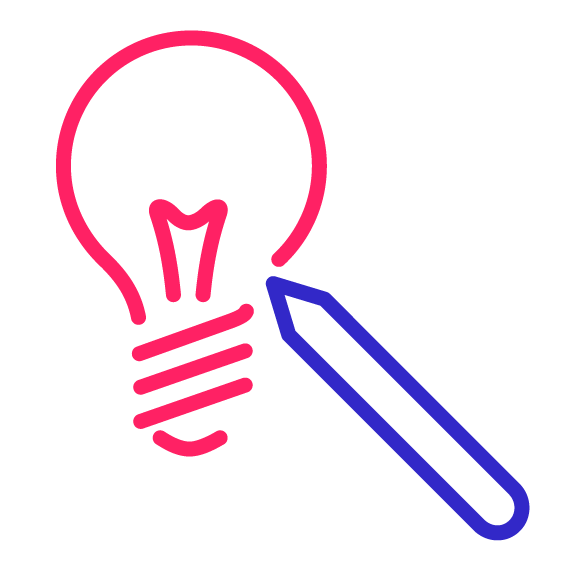
Intensive program
Only original instruments and methodologies from the world practice. From empathy to testing, our experts will guide you along all the design thinking steps, effectively directing the team to results.

Creative space
An innovative space, created in partnership with Steelcase and its design-team, who created Stanford d.school interiors. It was developed to accommodate most recent developments to support creativity, agility and creative confidence.
If you require more details about fees and course modules, allow us to contact you as soon as possible for a consultation.
Get in touch!
Получить информацию по ценам
Получить подробную программу курса

